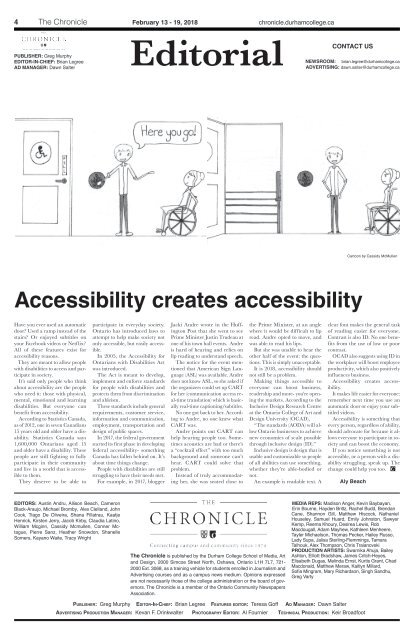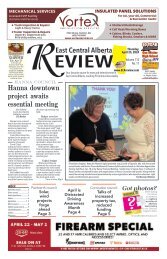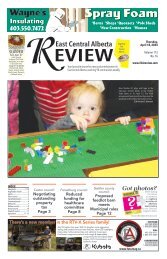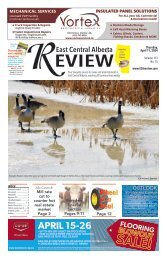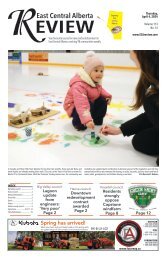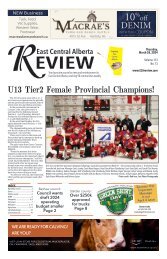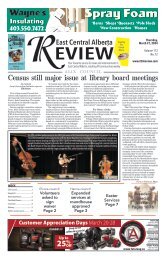Create successful ePaper yourself
Turn your PDF publications into a flip-book with our unique Google optimized e-Paper software.
4 The <strong>Chronicle</strong> February 13 - 19, 20<strong>18</strong> chronicle.durhamcollege.ca<br />
PUBLISHER: Greg Murphy<br />
EDITOR-IN-CHIEF: Brian Legree<br />
AD MANAGER: Dawn Salter<br />
Editorial<br />
CONTACT US<br />
NEWSROOM: brian.legree@durhamcollege.ca<br />
ADVERTISING: dawn.salter@durhamcollege.ca<br />
Cartoon by Cassidy McMullen<br />
Accessibility creates accessibility<br />
Have you ever used an automatic<br />
door? Used a ramp instead of the<br />
stairs? Or enjoyed subtitles on<br />
your Facebook videos or Netflix?<br />
All of these features exist for<br />
accessibility reasons.<br />
They are meant to allow people<br />
with disabilities to access and participate<br />
in society.<br />
It’s said only people who think<br />
about accessibility are the people<br />
who need it: those with physical,<br />
mental, emotional and learning<br />
disabilities. But everyone can<br />
benefit from accessibility.<br />
According to Statistics Canada,<br />
as of 2012, one in seven Canadians<br />
15 years old and older have a disability.<br />
Statistics Canada says<br />
1,600,000 Ontarians aged 15<br />
and older have a disability. These<br />
people are still fighting to fully<br />
participate in their community<br />
and live in a world that is accessible<br />
to them.<br />
They deserve to be able to<br />
participate in everyday society.<br />
Ontario has introduced laws to<br />
attempt to help make society not<br />
only accessible, but easily accessible.<br />
In 2005, the Accessibility for<br />
Ontarians with Disabilities Act<br />
was introduced.<br />
The Act is meant to develop,<br />
implement and enforce standards<br />
for people with disabilities and<br />
protects them from discrimination<br />
and ableism.<br />
These standards include general<br />
requirements, customer service,<br />
information and communication,<br />
employment, transportation and<br />
design of public spaces.<br />
In 20<strong>17</strong>, the federal government<br />
started its first phase in developing<br />
federal accessibility- something<br />
Canada has fallen behind on. It’s<br />
about time things change.<br />
People with disabilities are still<br />
struggling to have their needs met.<br />
For example, in 20<strong>17</strong>, blogger<br />
Jacki Andre wrote in the Huffington<br />
Post that she went to see<br />
Prime Minister Justin Trudeau at<br />
one of his town hall events. Andre<br />
is hard of hearing and relies on<br />
lip reading to understand speech.<br />
The notice for the event mentioned<br />
that American Sign Language<br />
(ASL) was available. Andre<br />
does not know ASL, so she asked if<br />
the organizers could set up CART<br />
for her (communication access real-time<br />
translation) which is basically<br />
real-time captioning/subtitles.<br />
No one got back to her. According<br />
to Andre, no one knew what<br />
CART was.<br />
Andre points out CART can<br />
help hearing people too. Sometimes<br />
acoustics are bad or there’s<br />
a “cocktail effect” with too much<br />
background and someone can’t<br />
hear. CART could solve that<br />
problem.<br />
Instead of truly accommodating<br />
her, she was seated close to<br />
the Prime Minister, at an angle<br />
where it would be difficult to lip<br />
read. Andre opted to move, and<br />
was able to read his lips.<br />
But she was unable to hear the<br />
other half of the event: the questions.<br />
This is simply unacceptable.<br />
It is 20<strong>18</strong>, accessibility should<br />
not still be a problem.<br />
Making things accessible to<br />
everyone can boost business,<br />
readership and more- you’re opening<br />
the markets. According to the<br />
Inclusive Design Research Centre<br />
at the Ontario College of Art and<br />
Design University (OCAD),<br />
“The standards (AODA) will allow<br />
Ontario businesses to achieve<br />
new economies of scale possible<br />
through inclusive design (ID).”<br />
Inclusive design is design that is<br />
usable and customizable so people<br />
of all abilities can use something,<br />
whether they’re able-bodied or<br />
not.<br />
An example is readable text. A<br />
clear font makes the general task<br />
of reading easier for everyone.<br />
Contrast is also ID. No one benefits<br />
from the use of low or poor<br />
contrast.<br />
OCAD also suggests using ID in<br />
the workplace will boost employee<br />
productivity, which also positively<br />
influences business.<br />
Accessibility creates accessibility.<br />
It makes life easier for everyone:<br />
remember next time you use an<br />
automatic door or enjoy your subtitled<br />
videos.<br />
Accessibility is something that<br />
every person, regardless of ability,<br />
should advocate for because it allows<br />
everyone to participate in society<br />
and can boost the economy.<br />
If you notice something is not<br />
accessible, or a person with a disability<br />
struggling, speak up. The<br />
change could help you too.<br />
Aly Beach<br />
EDITORS: Austin Andru, Allison Beach, Cameron<br />
Black-Araujo, Michael Bromby, Alex Clelland, John<br />
Cook, Tiago De Oliveira, Shana Fillatrau, Kaatje<br />
Henrick, Kirsten Jerry, Jacob Kirby, Claudia Latino,<br />
William Mcginn, Cassidy Mcmullen, Conner Mctague,<br />
Pierre Sanz, Heather Snowdon, Shanelle<br />
Somers, Kayano Waite, Tracy Wright<br />
The <strong>Chronicle</strong> is published by the Durham College School of Media, Art<br />
and Design, 2000 Simcoe Street North, Oshawa, Ontario L1H 7L7, 721-<br />
2000 Ext. 3<strong>06</strong>8, as a training vehicle for students enrolled in Journalism and<br />
Advertising courses and as a campus news medium. Opinions expressed<br />
are not necessarily those of the college administration or the board of governors.<br />
The <strong>Chronicle</strong> is a member of the Ontario Community Newspapers<br />
Association.<br />
MEDIA REPS: Madison Anger, Kevin Baybayan,<br />
Erin Bourne, Hayden Briltz, Rachel Budd, Brendan<br />
Cane, Shannon Gill, Matthew Hiscock, Nathaniel<br />
Houseley, Samuel Huard, Emily Johnston, Sawyer<br />
Kemp, Reema Khoury, Desirea Lewis, Rob<br />
Macdougall, Adam Mayhew, Kathleen Menheere,<br />
Tayler Michaelson, Thomas Pecker, Hailey Russo,<br />
Lady Supa, Jalisa Sterling-Flemmings, Tamara<br />
Talhouk, Alex Thompson, Chris Traianovski<br />
PRODUCTION ARTISTS: Swarnika Ahuja, Bailey<br />
Ashton, Elliott Bradshaw, James Critch-Heyes,<br />
Elisabeth Dugas, Melinda Ernst, Kurtis Grant, Chad<br />
Macdonald, Matthew Meraw, Kaitlyn Millard,<br />
Sofia Mingram, Mary Richardson, Singh Sandhu,<br />
Greg Varty<br />
Publisher: Greg Murphy Editor-In-Chief: Brian Legree Features editor: Teresa Goff Ad Manager: Dawn Salter<br />
Advertising Production Manager: Kevan F. Drinkwalter Photography Editor: Al Fournier Technical Production: Keir Broadfoot


